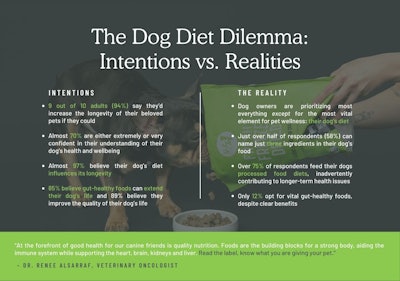
Adapted from a press release.
Get Joy, a dog wellness company that offers fresh dog food, treats, chews and vet services, unveiled its new research report, "Chasing our Tails: When it Comes to Maximizing our Dog’s Health and Wellness, Are We Just Running in Circles?" The report, created from a national online survey of dog parents, explored a paradox between the intentions of dog owners and the realities of their actions in contributing to the longevity of their canine companions.
The survey was conducted by Torfac between February 1-5, 2024, and focused on 1,000 dog parents, ages 18-70+, distributed across all regions, and approximately half male and half female.
According to the report, a major discrepancy between what dog owners believe to be beneficial for their pets and the actual practices they implement, particularly in the realm of nutrition, was found. For example, the survey showed diet was not among the top activities for managing a dog's well-being, yet it is the most critical according to vets. While 97% of dog owners acknowledge the impact of their pet's diet on longevity, only 12% are currently feeding their dogs fresh food. Tom Arrix, founder and CEO of Get Joy, said processed foods could compromise the health and vitality of pets.
"My life took a profound turn when our family dog, Cooper, battled lymphoma," Arrix said. "While exploring the healing power of nutrition, I had a wake-up call to the harmful effects of feeding my dog kibble – something we know is occurring on a large scale in today’s market.
"“It’s clear that dog families have the best intentions, but misinformation and a market flooded with processed options can cloud decision-making," Arrix continued.
Key survey findings
- Nine out of 10 adults (94%) say they’d increase the longevity of their pets if they could.
- Survey respondents rank their pets’ overall health as better than their own and almost 70% are either extremely or very confident in their understanding of their dog’s health and wellbeing.
- Despite high confidence in their dogs' health, there's a significant gap between perception and reality:
- Dog owners are prioritizing almost everything except for – according to vets – the most vital element for pet wellness: the dog’s diet. Only 53% say they are regularly feeding their dog healthy food, versus other activities such as getting enough sleep (73%), spending time with family (73%), and visiting the vet for routine checkups (68%).
- 83% of pet parents are confident about their dog's food content, but only 58% can name three ingredients.
- According to VCA animal hospitals, 50% of dogs in the U.S. are considered obese, emphasizing the importance of addressing diet and nutrition to combat this issue.
- Gut health awareness: Despite recognition of its importance, the majority of pet parents have yet to embrace gut-healthy dietary practices, with only 12% of pet parents feeding their dogs fresh food that promotes gut health.
- 75% of respondents feed their dogs processed food diets
- The report notes a sizable majority also believe that gut-healthy foods can extend their dog’s life (83%) and improve the quality of their dog’s life (89%).
While the majority of survey respondents expressed confidence in their understanding of their pet's health, the report noted this confidence often accompanies a lack of awareness regarding the ingredients and nutritional value of the food they provide. The report also highlighted the alarming prevalence of obesity among dogs with 50% classified as overweight or obese. Studies have shown that transitioning dogs from processed diets to fresh foods can lead to a significant decrease in disease markers, emphasizing the critical role of nutrition in canine wellness, said Dr. Brett Levitzke, DVM, chief medical officer at VERG Brooklyn and Get Joy veterinary advisor.
"Nutrition is something we do with our pets twice daily," said Levitzke. "Even simple changes can have a profound impact on our dog's overall wellness."
See the full report here.
 Get Joy
Get Joy


















